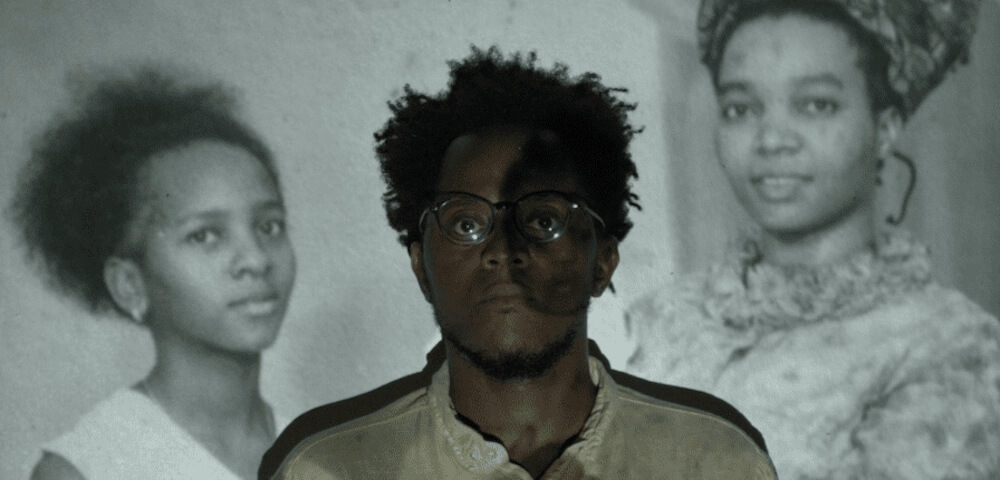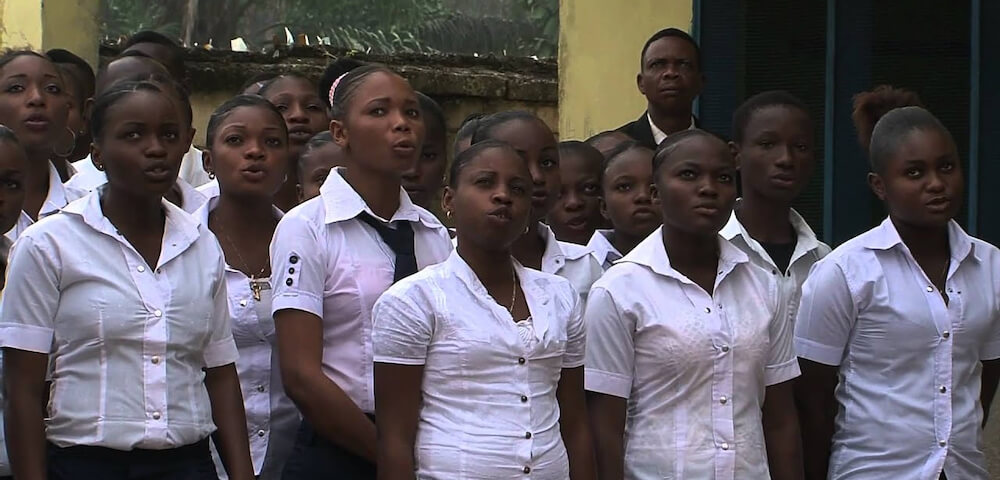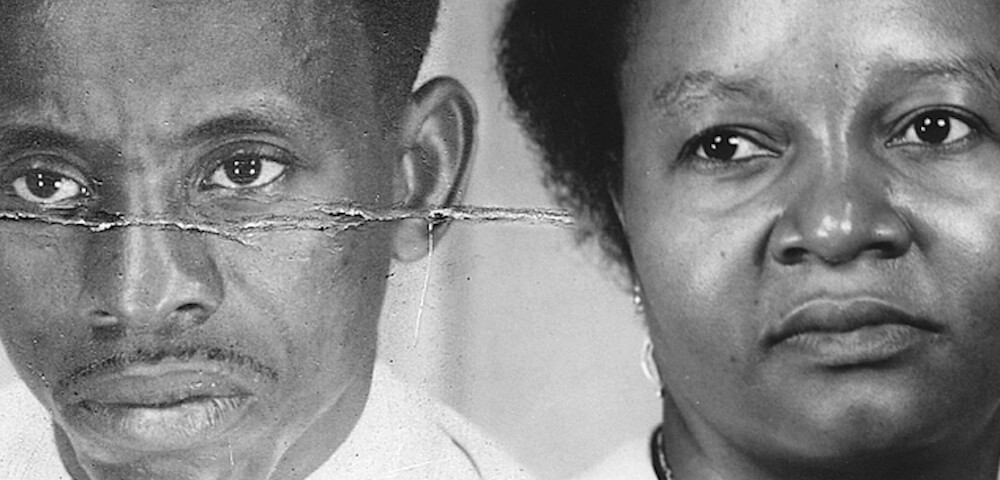
Hot on the heels of the premiere theatrical run of his brilliant documentary COCONUT HEAD GENERATION – which details the use of a student cinema club in Nigeria as a vanguard of political activism – filmmaker Alain Kassanda will be at Spectacle for one night only to present two films in dialogue about his home country of the Democratic Republic of the Congo. Kassanda’s friend and contemporary Dieudo Hamadi’s is one of the most promising young documentarians working out of Africa (or anywhere); his documentary NATIONAL DIPLOMA follows a class of students navigating a fraught educational system, ultimately testifying to the bizarre bureaucratic rigamarole that betrays the long afterlife of Belgian colonialism. NATIONAL DIPLOMA will be followed by Kassanda’s 2022 documentary COLETTE AND JUSTIN, which tells the story of the said colonial exploitation through mesmerizing interviews with Kassanda’s grandparents. Each film will be introduced by Kassanda and followed by a discussion.
NATIONAL DIPLOMA
dir. Dieudo Hamadi, 2014
92 min. Democratic Republic of the Congo.
In French with English subtitles.
SUNDAY MAY 5 – 5 PM followed by a discussion with Alain Kassanda
ONE NIGHT ONLY!
Joel loads a stack of boxes onto a hand truck and weaves his way through a crowded outdoor market in Kisangani, one of the largest cities in the Democratic Republic of Congo. An orphan who lives with his aunt, Joel doesn’t want to be a courier forever. But if he is to have any hope of a brighter future, he must first pass the national exam—the key to better employment and a post-secondary education. And to take the exam, he needs money.
NATIONAL DIPLOMA follows Joel and a group of his classmates in the two months leading up to their taking the national exam. Things start off badly, when the high school principal walks into a class full of students preparing to take a mock exam and expels Joel and more than a dozen others for unpaid school fees. Undaunted, the students rent an unfinished house across the river. The floors are covered in debris, there is no furniture, and live wires snake down interior walls. But the teens hammer a blackboard into a brick wall, set a cookstove on the floor, and set about teaching each other algebra, philosophy, and the other subjects they will need to pass.
What makes this verite documentary exceptional is its ability to capture telling details: the sign above the principal’s desk saying anything is possible with hard work, just before he expels students over fees; girls brushing each other’s hair in the downtime between studying sessions; the ecstatic and intimate moments in church and visiting a faith healer, as the students seek any help they can get.
As the exam date approaches, the principal visits the students and implores them to return so he can pay the school’s staff. Meanwhile, the young scholars have discovered that the key to passing the exam may not lie in studying, but in finding a trusted source who can leak them the answers.
Director Dieudo Hamadi grew up in Kisangani and was one of the half a million Congolese students who took the national exam each year. NATIONAL DIPLOMA is a closely observed film that offers no overt political commentary as it chronicles the hypocrisy, anxiety and distortion in a deeply colonial system.
“Admirably well directed, the film strikes a subtle balance between its focus on the group and the individual. Young director Dieudo Hamadi has as much empathy for those he films as he has skepticism toward their absurd circumstances.” — Cahiers du cinema
“Congolese director Dieudo Hamadi’s second feature-length film offers a poised and engaging view of his hometown’s high-school students confronting their graduate exams. A remarkable piece of cinema verite, which goes mightily up close to its subjects, NATIONAL DIPLOMA is proof of Hamadi as one of Democratic Republic of Congo’s (if not Africa’s) most observant documentary-makers.” — The Hollywood Reporter
COLETTE AND JUSTIN
dir. Alain Kassanda, 2022
83 min. France/Belgium.
In Lingala and French with English subtitles.
SUNDAY, MAY 5 – 7:30 PM followed by a discussion with Alain Kassanda
ONE NIGHT ONLY!
Born in Kinshasa and living in Paris, filmmaker Alain Kassanda embodies the classic immigrant dual identity: in the Democratic Republic of Congo he is seen as French, while in France he is seen as Congolese. Determined to understand the colonial legacy from which he comes, Kassanda convinces his grandparents—Colette and Justin—to sit for a series of interviews. Together, they watch old news footage, remember a visit from the Belgian king, and recall what life was like as part of the nascent Black bourgeoisie who served the colonial administration.
But COLETTE AND JUSTIN is more than a film about family reminiscences. Kassanda uses a wealth of black-and-white archival footage to tell the story, superimposing his own thoughts and his grandparents’ voices over the visuals—in effect, using the colonizers’ images against them. (He generally avoids footage of the horrors, focusing instead on daily life.)
Kassanda, we learn, has two heroes: Justin and inaugural Congolese president Patrice Lumumba, who was murdered by secessionists in collusion with Belgium. In the course of making COLETTE AND JUSTIN, he realizes their lives were intertwined far more deeply than he had realized.
COLETTE AND JUSTIN begins with one man’s search to understand himself and his roots. But ultimately it is an evocative, poetic and thoughtful meditation on the intersection of political and family history, and the multi-generational destructive reach of colonialism.
“How do you depict the impact of colonisation, decolonisation, a civil war and a destructed economy in one film? Director Alain Kassanda decided to portray his grandparents, who were both born in what was then called Zaire, and lived through all of these traumatising times. The result is a deeply personal, sometimes poetic, sometimes harrowing (hi)story of oppression, revolution, betrayal, disillusionment and love.” — Business Doc Europe
“Connects Congolese history to family history… a thoughtful debut.” — The Film Verdict
“Powerfully re-employs Belgian colonial footage and photographs for anti-colonial purposes… explores the complexities and ambiguities of the colonial reality… a crucial recovery of long-suppressed history.” —Documentary Magazine
“The personal scope to the story draws audiences in… Films like this humanize historical events and allow those who lived through them to speak with their own voices. Highly recommended.” —Educational Media Reviews Online
Programmed in collaboration with Several Futures. Special thanks to Graham Carter and Icarus Films.


